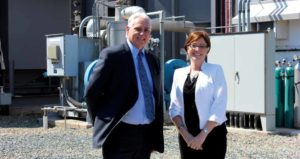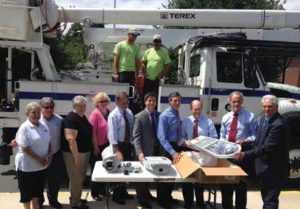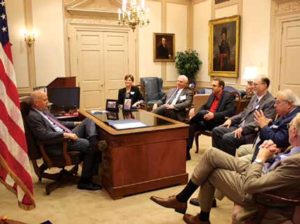DEMEC
4 min reada
a
May 2017
After Hurricane Sandy made landfall in the fall of 2012, electric providers all over the eastern seaboard struggled for days to get the lights back on. Through a combination of preparedness, mutual aid and hard work, the Delaware Municipal Electric Corporation’s (DEMEC) outages were measured in terms of hours, rather than days.

DEMEC President and CEO Patrick McCullar (left) with DEMEC Senior Vice President of Operations and Power Supply Kimberly Schlichting.
“The eye of the hurricane was coming straight for Delaware, and I thought ‘Oh my, we’re in trouble,” said Kimberly Schlichting, DEMEC’s senior vice president of operations and power supply.
“We just hunkered down that night, and in the morning we were happy to report that three of our nine members had zero outages; the others were up and running within hours,” Schlichting said. “While DEMEC was ultimately able to recover from Hurricane Sandy without additional aid, knowing that AMP’s Mutual Aid program – along with the APPA national mutual aid network – was in place made a big difference. Just knowing that their willingness and availability to help us was at our fingertips was a huge comfort that I just cannot stress enough.”
DEMEC has been an AMP member since 2011. It is unique among AMP’s membership as a joint action agency, serving the needs of municipal electric distribution utilities across the state of Delaware. With a peak load of over 452 megawatts (MW), DEMEC serves more than 129,000 residents and businesses. Its member communities include the cities and towns of Clayton, Lewes, Middletown, Milford, New Castle, Newark, Seaford and Smyrna.
DEMEC was formed in 1979 as a joint action committee (JAC) and wholesale electric utility. Today, DEMEC has approximately 10 fulltime employees and is one of less than 30 joint action agencies across the country. DEMEC is nationally represented by the American Public Power Association (APPA), of which Schlichting is a member of the Board of Directors.
DEMEC’s President and CEO Patrick McCullar is also active with APPA and is a member of the AMP Board of Trustees, currently serving as AMP Treasurer.
According to Schlichting, DEMEC’s status as a joint action agency allows it to bring advanced technologies and best utility practices to meet the unique needs of its members quickly and effectively, while being able to leverage the economies of scale for purchasing and policy change.

DEMEC directors, CEO and congressional members kick off the joint LED streetlight program in 2013.
“We provide a lot of services to our municipalities, from helping them aggregate to provide lower costs to their customers, to providing value-added services like training sessions, demand response programs, RPS compliance programs, and energy efficiency programs,” Schlichting said. “By joining together there is strength in numbers. Collectively we can help form and initiate policies for issues that would affect their industries at the state and federal level with a unified voice.”
DEMEC’s member communities come in a variety of sizes and needs, with many of the members receiving 100 percent of their power needs through DEMEC.
“DEMEC’s business model is different from that of an investor-owned utility, and we’re not like an electric cooperative, which only focuses on electric service,” Schlichting said. “DEMEC understands we are a part of a full service municipal business model. While electric service is one of our members’ top priorities, the municipality’s offer a ‘total service package’ to our end-use customers, which includes water, sewer, trash, parks and recreation and police protection.”
This “total service package” is highly competitive with other areas of the Mid-Atlantic and helps attract desirable economic development in our communities.
One of DEMEC’s initiatives, in response to its customer desires, involves increasing the amount of renewable energy in its portfolio, far exceeding state requirements in coming years. As part of Delaware’s statewide Municipal Renewable Portfolio Standard, DEMEC’s goal is to include 25 percent renewables in its portfolio by 2025, with about 3.5 percent of that from solar generation.
“We have more solar generation located in our municipalities than any other electric service territory in the state. DEMEC has 40 percent of the installed solar generation, including a 10-MW facility in Dover, a 13-MW solar farm in Milford, and we’re building a 1.5-MW facility in Smyrna,” Schlichting said. “In addition to supporting individual residential roof mount systems, we’re supporting a community solar initiative that will place larger scale, behind-the-meter solar in our member’s communities. This helps highlight each member’s support for solar. Several of our utilities have received national recognition for the most solar installed per capita.”

DEMEC members meet with Gov. Jack Markell in 2016 for the signing of a proclamation recognizing DEMEC and public power.
DEMEC is also in the process of evaluating the opportunities of an emerging technology that could place floating solar panels in its communities to generate additional electricity. Along with supporting renewable energy goals, Schlichting explained that if feasible, such a project like floating solar would give the added benefit of preserving valuable land for economic development.
“That would preserve land that could otherwise be put to use for commercial purposes, to generate additional revenue for the municipalities,” she said. “It’s an interesting project that’s just beginning to be evaluated, but it’s important to anticipate what will be coming next.”
Being a member of AMP has enabled DEMEC to expand similar goals. The agency is currently taking part in AMP’s Solar Phase II project, and already has outtake from the AMP Fremont Energy Center.
DEMEC continues to look forward and evaluate changing practices and technologies that would benefit its municipal members. DEMEC currently has two members implementing advanced metering infrastructure (AMI) under the AMP program, with expectation of all members eventually embracing the technology. DEMEC has also recommended its members participate in the Efficiency Smart Program to promote energy efficiency for the benefit of their communities.
To learn more about DEMEC and their member communities, visit www.demecinc.net. To learn more about AMP’s members visit the members page of the AMP website.


